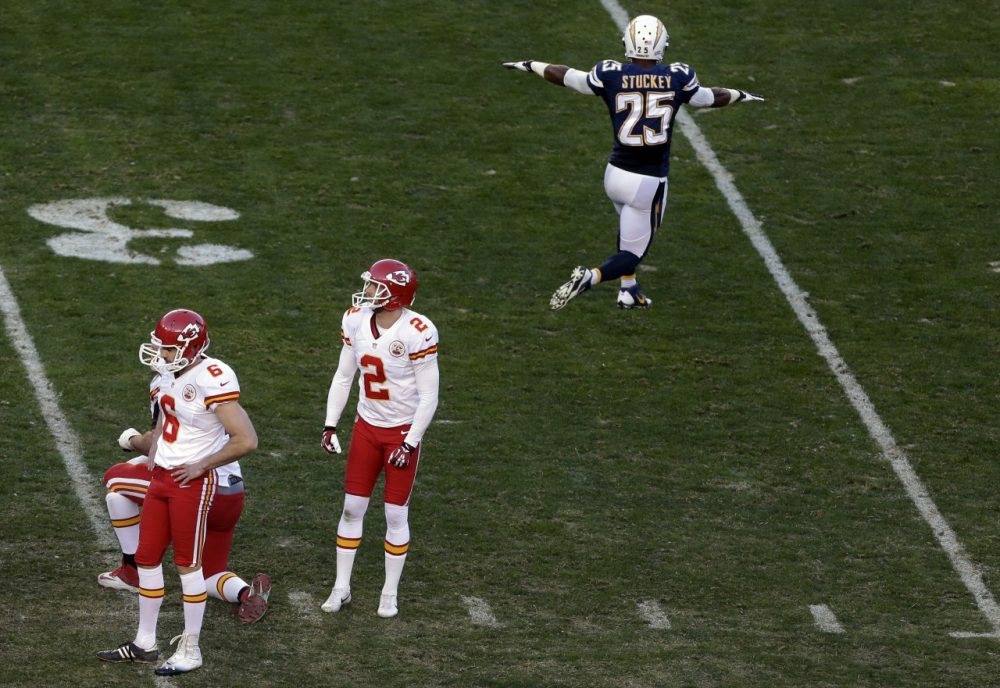Advertisement
NFL Officiating Blunders Draw Scrutiny
Resume
By now, Pittsburgh Steelers fans have perhaps come to terms with the fact that their team didn’t make the playoffs—except for the ones clinging to outrage. Barry Wilner writes about the NFL for the AP. He spoke with Bill about his recent story, "More Officiating Gaffes Hurt NFL."
BL: Barry, how might the Steelers have benefited if the San Diego Chargers had been penalized for having an illegal formation when the Kansas City Chiefs missed a field goal attempt last weekend?
[sidebar title="A Week In The Life" width="330" align="right"]In 2012, OAG's Doug Tribou took a peek at an NFL ref's typical week. [/sidebar]BW: They probably would have benefited by being in the playoffs because Ryan Succop, who’s quite a good kicker and missed the kick from 41 yards probably would have made it from 36, and that would have eliminated San Diego and put Pittsburgh into the playoffs in a very weird scenario in which the Steelers needed just about everything to break right on the final day of the season and almost did.
BL: You have written that it has not been a great year for the zebras. You even suggest that people care more about what the officials have done wrong than what the players have done right. Has this been an especially bad year for officiating?
BW: On top of last year when they had the fiasco of the replacement officials, you would have thought that this year might have been one of the best for officiating. I would say that, yes, there’s been some huge problems in the NFL—far more instances where the league’s chief of officiating, Dean Blandino, who’s very good at what he does, has had to apologize to teams for missed calls or misinterpretations of the rules. So, yeah, I would say that this was not a great for officiating in the NFL.
BL: Why are the officials getting it wrong so often? Have the rules become more difficult to understand or enforce?
BW: Bill, I think you hit it right on the head. The problem is, to me, there’s much too many rules and too many tangents to those rules. And because of that and all these 22 players who are bigger, faster, younger than the officials, it all combines for a very difficult sport to officiate. And I would make the argument that most of the other pro sports are better officiated than the NFL, because the NFL just has too many of these rules where things are not clear. There’s not a lot of black and white. There are too many gray areas and just too many tangents to the rules.
BL: One of the recent disputed calls involved an allegedly “uncatchable ball.” The idea is that a defensive player who might be penalized for interfering with an offensive player trying to catch a pass isn’t penalized if the ball is deemed to be uncatchable. And I guess the definition of that term has been elusive.
BW: (laughs) As elusive as Jerry Rice used to be when going out for catches. That’s a great way of putting it. They do need that kind of a rule because sometimes you will get contact between players in situations where the ball is just so far thrown away that the contact’s really incidental. It had no effect on a play. But there are just enough plays where a receiver or even a defensive back—they are so athletic and almost acrobatic that they can come up with some really wild catches. So again there’s a big gray area when it comes to something like uncatchable balls.
BL: As you have mentioned, in a couple of instances the NFL has acknowledged, albeit belatedly, that the officials made a wrong call or failed to make a call they should have made. Has that acknowledgement made anybody feel better?
BW: I think the fact that they’re trying to be a little bit more transparent does help. It doesn’t help the feelings of Pittsburgh fans, no, and it doesn’t help the feelings of Mike Shanahan, who twice this year had some officiating issues, and Mike Shanahan is out of work right now. What the players and what the coaches and what the owners and the general managers all want is just better officiating.
BL: Currently most of the officials are part-time employees. They have day jobs, and many, including former NFL head of officiating Mike Pereira think that officiating should be a full-time job. Would that make any difference?
BW: Yes, I think Pereira’s right on the ball there. I think that at the very least, as he told me this week, all of the referees should be full-time employees of the league because they’re the heads of the crews, and they’re the guys who can have the most power over ability of these officiating crews to get things right.
This segment aired on January 4, 2014.